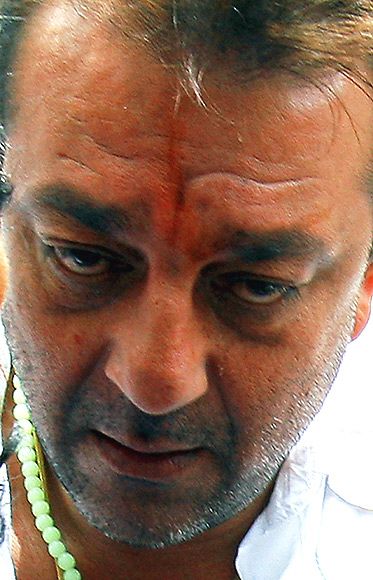 | « Back to article | Print this article |
 Security expert B Raman says his views about actor Sanjay Dutt have nothing to do with his celebrity status or his family and social connections
Security expert B Raman says his views about actor Sanjay Dutt have nothing to do with his celebrity status or his family and social connections
I have been in receipt of many tweets and emails criticising me for advocating that the case of Sanjay Dutt, who has been convicted under the Arms Act for having been found in illegal possession of two fire-arms and sentenced to five years of imprisonment, should be treated differently and any petition from him for a lenient view of his guilt should be considered sympathetically.
In my first tweet after his conviction by a bench of the Supreme Court, I had said that, as in the US, there is a need for a provision in our laws under which a court can allow a convicted criminal in certain cases to do compulsory community service in lieu of imprisonment to cover cases like that of Sanjay.
Subsequently, I had tweeted my agreement with the view of retired Justice Katju, chairman of the Press Council of India, that Sanjay’s case deserves pardon in view of the good service to the community that he and his parents had done in the past. However, I had differed from Katju in respect of the community service.
I am of the view that Sanjay could be considered for pardon not for his good service of the past, but for the community service that he promises to do in future in lieu of the imprisonment.
His performance has to be closely monitored by someone designated by the governor to ensure that he carries out his solemn commitment. If he violates his commitment, his pardon should be cancelled.
My views have been strongly criticised on the following grounds .Firstly, he has committed a heinous offence by accepting a gift of arms from a person allegedly connected with Mumbai’s mafia.
Secondly, if any special consideration is shown to him by virtue of his celebrity status, it would be a violation of the sacred principle of equality before law.
Thirdly, there are many others who are languishing in jail despite their good service to the community. When the law has not shown them any special consideration, why should it show a special consideration only to Sanjay.
Sanjay is a confirmed convict under the Arms Act against whom a minimum sentence of five years as provided in the Arms Act has been awarded by the Supreme Court.
Taking into consideration the 18 months that Sanjay had already spent in jail during the trial, the court has ordered that he should spend another three-and-a half years.
I argue for a lenient view in his case on the following grounds
If he was aware of this fact, as a law-abiding citizen, he should have immediately alerted the police and his failure to do so would have amounted to complicity in an act of terrorism. Since there is no evidence to show that he was aware of this fact, he cannot be accused of complicity in an act of terrorism.
The trial went on for 20 years. Had he been tried separately under the Arms Act and not with others, his case might have concluded a long time ago and by now he might have completed his sentence.
Taking into consideration the facts and circumstances relating to the conviction of Sanjay I had suggested that he should be treated differently and a sympathetic view should be taken if he petitions for pardon.
It will not be a violation of the principle of equality before law. My views have nothing to do with his celebrity status or his family and social connections.
If there are others with similar facts and circumstances, their cases have to be examined in the light of those facts and circumstances without any prejudice.
In my view, Sanjay had to suffer unfairly because of his case being clubbed along with the cases of the conspirators and perpetrators of the blasts in the absence of credible evidence to warrant it.
I will be happy to stand corrected if I have failed to consider any other relevant fact relating to him.